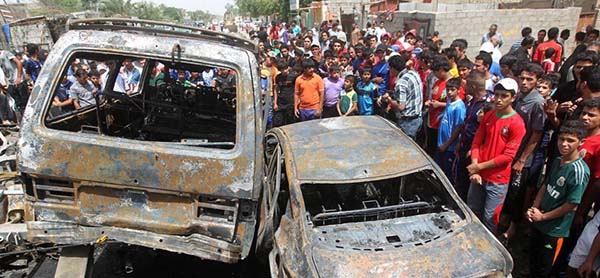The sectarian violence unceasingly continues with no promising sign of possible stoppage in Iraq. On Friday two bombs targeting mainly Sunni community and left 41 dead and 57 wounded in Baquba city, 50 Kilometer north of Baghdad. One of the bombs went off near a Sunni mosque when Sunni worshipers were leaving the mosque after completion of Juma prayer and the second detonated when people gathered to help the victims.
In Madain, south of Baghdad, also a roadside bomb exploded near a funeral procession for a Sunni man, killing eight people and wounding at least 25 according to security and medical officials. Prime Minister Nuri al-Maliki on Thursday blamed the violence on religious intolerance.
“The bloodshed... is a result of sectarian hatred,” Maliki said. “These crimes are a natural result of the sectarian mindset.”
The burst of violence raises the prospective of tit-for-tat killings common during the height of sectarian bloodletting in the country that left tens of thousands of people dead. The simmering tension between
Sunni and Shiite is not new thing but the recent round was started five months ago when Sunni groups held protest against government blaming it for committing discrimination against them as blaming of them of collusion with terrorist groups.
When demonstrations turned violent last month in Kirkuk and demonstrators clashed with security forces, fear has grown up of nightmarish full-fledged sectarian war. Since the Shiite secret places have generally came under attack by Sunni radicals which left hundreds dead. Just on Tuesday and Wednesday last week, series of suicide bombings targeting Shiite community left around 120 dead and hundreds wounded.
As mentioned, the sectarian violence is not new, rather has deep roots within the country. On February 2006, a suicide bombing in the shrine of Hazrat Imam Askari, the eleventh Shiite Imam, in Samera unlocked a period of sectarian violence that left hundreds dead and thousands became refugees.
However the government has held steps to ease tensions but have not yielded any visible effects perhaps due to long lasting distrust dominant to the country. It released individuals from the prisons and gave up charges against those who were convicted of terroristic activities.
The roots of distrust stretch back to decades ago. After the collapse of Hashimite monarchy in late 50s and resumption of power by Baath party somehow was welcomed by Majority. The situation deteriorated when Ahmad Hassan Al-Bakr was forced to resign by Saddam Hussein.
During his rule, Shiite often rebelled against him but he ruled the country with clenched fist and could suppress any revolt against his regime. His main power centers were Sunni minority sect which could provide him an advantage to crackdown any uprising. He was very ambitious and wanted to build strong government. He desired to change Iraq to one of regional power and became the leader of Arab countries.
But his vision for a strong Iraq finally worked in reverse. Iraq changed into a poor and week country in spite of huge resources. His ambition and fearless activities and programs finally pushed Iraq into utter isolation which left his regime helpless to realize his goals. The interference of United States changed the entire power calculations in the country. Generally, Sunni unintentionally were pushed into margin. Because Sunni were the power center of Saddam Hussein, and fighting Baath party necessarily led to weakening the Sunni sect. the United States encountered huge resistance and Sunni insurgents fought against American security forces.
However, efforts made to motivate minorities to take part in the political processes but part of them did not take interest. In the second parliamentary election, however, Iraqis participated in election irrespective of sects but meanwhile Sunnis have remained suspicious of Nuri al-Maliki, the Shiite Prime Minister. They suspect him that he tries tomarginalize them from the power and establish an Iran-tilted government, the thing which he constantly rejects.
One of the key problems is suspicion that he tries Sunnis of terrorist activities. The situation deteriorated when vice-President Tariq al-Hashimi was convicted of terroristic crimes and sentenced to death.
Now Tensions are festering between the government of Maliki, a Shiite, and members of the Sunni minority who accuse authorities of targeting their community, including through wrongful detentions and accusations of involvement in terrorism. In the country like Iraq where sectarianism has strong voice, any suspicion of the government end up to putting the entire Shiite community into suspicion.
For the sin of government or Nuri al-Maliki the entire community should be punished. Such process has led to strengthening of Shiite radical groups. The recent tit for tat killings of fundamentalist groups are finding ground supporter within both communities. If the situation continues like this, it is possible that division between two sects become sharp that may spill over in the rest of countries.
Even presently it is widely believed that the recent violence which only in April this left around 700 dead is linked to sectarian violence in Syria. If the assumption is true, similar sectarian violence may be sparked in the rest of Arab countries. The only way forward is that the government should take serious step in changing the concept of the minority that it has no intention to push them back from the power. Sunni MPs should play a bridge role between the government and community otherwise the country would not able to move on the track toward democracy, stability and economic prosperity.

